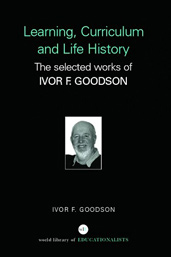Learning, Curriculum and Life Politics: the selected works of Ivor F. Goodson
Towards a Social Constructionist Perspective
Towards a Social Constructionist Perspective: From Diagnosis to Solution
CAP and major tendencies in the reaction to CAP both share one characteristic: namely a concern to develop models of 'idealised practice' (Reid 1978). Both models are concerned with what ought to be happening in schools, 'our commitment to what should be', as Westbury argues, this can lead to 'meliorism':
A vision can so easily slide into meliorism and, unfortunately, the consequences of such a meliorist perspective have long beset our field: too often and for too much of our history we have not been able, because of our commitment to what should be, to look at what is. To look at what is betrays, our emphases suggest, too little passion, even perhaps a conservative willingness to accept schools as they are. Indeed, all too often our stances imply a condemnation of what schools do (Westbury 1973).
For those reacting to the often conservative prescriptions of CAP theorists the full embrace of practice faced the somewhat comparable possibility of conservatively accepting existing practice. In doing this the reaction to CAP threw the baby out with the bathwater. Neither model therefore came to terms with understanding practice, with why matters work the way they do in schools.
It is therefore important to restate the problems of CAP. The problem with CAP is not only that the focus is solely on prescription but that the kind of focus is disembodied and decontextualised. A solution would therefore be closer if we had systematic inquiries of how curriculum prescriptions are in fact socially constructed for use in schools. Studies of the actual development of courses of study, of national curriculum plans, of subject syllabuses and so on.
The problem therefore as we restate it is not the fact of the focus on prescription but the singular nature of that focus and the kind of focus. In short what we require is a combined approach to social construction - a focus on the construction of prescriptive curricula and policy coupled with an analysis of the negotiations and realization of that prescribed curriculum. The approach therefore is to broaden the deliberative mode with studies of practice and prescription, focusing on the essentially dialectical relationship of the two.
We want, in short, 'the story of action within a theory of context'. This then is to move a step back towards the centre following the moves of Schwab and some curriculum reformers to fully embrace the practical terrain. This I have argued was too extreme a reaction albeit understandable at the time. Since prescription continues (and given the current centralist thrust will in fact strengthen) we need to understand social construction of curricula at the levels of prescription and process and practice. In short, the diagnosis of Schwab and some of the curriculum reformers who saw the curriculum field as moribund is broadly accepted; their solution, however, is seen as too extreme. What is required is indeed to understand the practical but to locate this understanding within a further exploration of the contextual parameters of practice.
